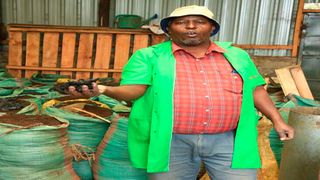Breaking News: At least 10 feared to have drowned in Makueni river

Job Kanyi explains how he makes organic fertiliser from sugarcane bagasse on his farm in Nyeri. Joseph Kanyi | Nation Media Group
|Seeds of Gold
Premium
Here is the treasure I make from sugarcane bagasse
What you need to know:
- Kanyi, a former high school teacher of agriculture, makes organic fertiliser from sugarcane bagasse.
- He has converted a quarter-acre of compound into a fertiliser manufacturing plant.
Sweet smell of sugarcane stems placed in wooden boxes inside a greenhouse welcome the Seeds of Gold team to Job Kanyi’s residence in King’ong’o, Nyeri.
Kanyi, a former high school teacher of agriculture, makes organic fertiliser from sugarcane bagasse, the dry pulp that remains after crushing sugarcane to extract its juice.
He has converted a quarter-acre of compound into a fertiliser manufacturing plant, trading under the name Joka Organics.
His plant consists of a warehouse from where he mixes and stores prepared fertilisers and a greenhouse for drying the bagasse.
“The sugarcane remains contain nutrients that improve poor soils. Its organic carbon also lasts for a long period once applied to such soils,” says Kanyi, who started the business in 2016, bothered by the fact that he did not know where to deposit the waste produced by his sugarcane processing plant in Nyeri town.
In a day, his juice bar would produce two to three bags of bagasse. He did research and later realised he could manufacture the bagasse and mix it with manure to make a solid carbon fertiliser that helps stabilise soil pH by moderating its acidity or alkalinity and increases water retention capacity.
“When I started, it was difficult getting the pyrolysis equipment used to burn the bagasse after drying. I customised my own equipment by acquiring two metal drums and a crushing mill at Sh128,000.”
Fast-growing crops
He first stores the bagasse in his greenhouse for three weeks to dry. Later, he burns it in the absence of oxygen at high temperatures of 200 to 550 to produce biochar, a solid charcoal-like substance.
He then crashes the biochar, which contains active carbon, into a fine powder before it is mixed with manure from chickens, pigs, cattle, goat and plant waste.
“It is essential to mix the droppings from different animals because of the contrasting nutritional value they contain. I buy manure from different farmers at Sh40,000 a lorry.”
For plant waste, he lets it de-compost for up to four months before he mixes with biochar.
“Fertiliser that contains a lot of biochar, more than 20 per cent, should be applied to fast-growing crops like maize, beans, potatoes and cabbages,” he says, adding he sell the product at Sh40 a kilo.
On the other hand, fertilisers with less than 20 per cent biochar are ideal for slow-growing crops like coffee trees, macadamia, avocados and oranges.
“This is because a farmer will be required to apply the fertiliser as many times before the crop matures.” Such fertiliser goes for Sh20 per kilo.
In a month, he produces up to 500 50kg bags of fertiliser.
Organic fertilisers
His main customers are coffee farmers, who buy about 30 bags monthly of the product.
Kanyi says when he started the business, fellow farmers did not understand why he would sell organic fertilisers to them.
“But I hold demos on my farm and also give away the produce for sampling. More customers come through referrals.”
Sorghum, rice and maize waste can also be used to manufacture organic fertilisers.
“Sorghum bagasse makes a good fertiliser but the crop is only grown by farmers in Meru, which is far and expensive for me because of the extra transport costs,” says Kanyi, 60, who has applied for certification from Kenya Bureau of Standards.
He buys more bagasse from cane sellers in Nyeri town at Sh50 per 90kg bag. In a day, he gets three bags from them.
"These sellers buy sugarcane from farmers in the area, there are more than 400 cane farmers in Nyeri.”
Soil nutrient content
Ever since he started making the fertiliser, he stopped growing sugarcane on his quarter-acre farm.
Prof Nancy Mungai from the Department of Crops, Horticulture and Soils at Egerton University notes biochar itself is low in nutrients thus must be mixed with manure. However, its main benefit is in the long-term as it betters physical soil properties.
“Organic carbon improves the soil structure, water retention and also enhances soil nutrient content for farming if applied at moderate rates.”
However, she adds that in the short-term, use of biochar only can lock nutrients in the soil because of high carbon and low nitrogen.
“Mixing biochar with well-composted manure reduces its negative effects. Normally, biochar makes nutrients unavailable in the soil in the short-term,” she offers.
She notes the type of compost manure will determine how rich the fertiliser is. “Good compost manure is one that has undergone a proper decomposition process and contains a variety of materials,” she says.
Poultry manure, according to her, contains nitrogen, phosphorus and calcium, which are essential to crops. “It should be mixed with biochar as well as animal manure which may not be as rich but because of the varied nutrients the all have.”





